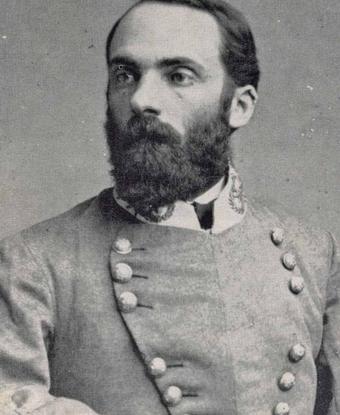Last updated: January 3, 2026
Person
Joseph Wheeler

public domain
A U.S. and Confederate army officer and congressman from Alabama, Joseph Wheeler graduated from West Point near the bottom of his class in 1859. Prior to the Civil War he was stationed with the Regiment of Mounted Rifles in the New Mexico Territory. While fighting a skirmish with Indians, Wheeler earned the nickname "Fighting Joe."
At the onset of hostilities, Wheeler joined the Confederate army on March 16, 1861 as a first lieutenant in the Georgia militia artillery. Less than six months later he was promoted to colonel in command of the 19th Alabama Infantry. Wheeler led his regiment at the Battle of Shiloh in April 1862, successfully covering the Confederate retreat on the second day. Transferring to the cavalry, he was given command of 2nd Cavalry Brigade in General Braxton Bragg's Army of Mississippi. Wheeler's troops conducted a successful rearguard action after the Battle of Perryville in October, and again after the Battles of Stones River and Chickamauga. He was promoted to brigadier general on October 30, 1862, leading cavalry attached to Bragg's forces, now renamed the Army of Tennessee. In December 1862, Wheeler's cavalry skillfully delayed Union General Rosecran's advance from Nashville, destroying four Union wagon trains and capturing around 1,000 Union soldiers.
General Bragg promoted Wheeler to major general on January 20, 1863 and gave him command of one of the army's two cavalry corps, which he led at the Battle of Chickamauga in September 1863. In October 1863, Wheeler commanded 5,000 cavalrymen in devastating raids against Union supply lines west of Chattanooga, destroying several railroad bridges, hundreds of wagons and more than a thousand mules. In 1864 and early 1865, he kept his cavalry in almost continual action against Sherman's Union forces, first during the Atlanta Campaign, then in the March to the Sea, and subsequently, during the Carolinas Campaign.
Wheeler's capture near Atlanta in May 1865, while covering Jefferson Davis' flight from Richmond, ended his hope of reaching Confederate General Kirby Smith and continuing the fight in the West. During the war, he was wounded three times, had 16 horses shot from under him, and lost 36 staff officers to combat. Along with Nathan Bedford Forrest, he earned a reputation as one of the top Confederate cavalry commanders. After the war, Wheeler served eight terms as a Democratic congressman from Alabama, and fought once more as a commanding officer, this time wearing the blue uniform of the United States, in both the Spanish-American and Philippine-American Wars.
